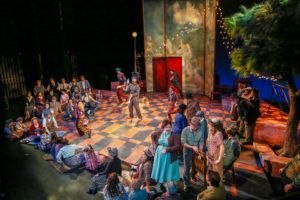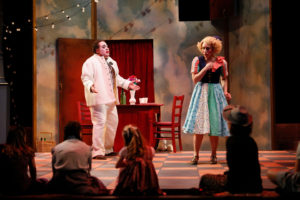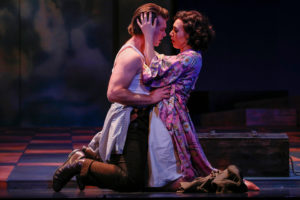Pagliacci 101. Part 1

By Kelly Maxwell
“Imagine those paired theater masks: one laughing and one weeping. It’s a familiar image, one in use since ancient Greece where the masks served to delineate characters in a stage production. In the world of opera, many of the most famous works blend comic and tragic elements, though perhaps none quite as pointedly as Leoncavallo’s Pagliacci. The title even means ‘The Clowns,’ though the ending is far from amusing. The lead tenor Canio’s ever famed aria ‘Vesti la giubba’ makes a point of emphasizing the juxtaposition. ‘Put on the costume,’ he bemoans, ‘the people pay and want to laugh.’ Late in the aria, to potent high notes, he declaims, ‘Ridi Pagliaccio, sul tuo amore infranto!’: ‘Laugh, clown, though your heart is shattered.’”
Music Historian Betsy Schwarm notes how Pagliacci is built on antithetical elements. How does a clown experiencing heartbreak and eventually losing his grip on reality relate to all of us in the audience? By forcing a smile on-stage, Canio is attempting to put on a funny front; who among us can’t recall a moment where our insides were not allowed to match our outsides? Even if we’ve never portrayed a character on-stage, we all play our particular parts in daily life. Pagliacci has endured because of the heart-breaking humanity portrayed in its relatively brief (by operatic standards, at least) 100 minutes. For every moment of levity, acrobatics, and deeply-rooted theatrical tradition, there are equal amounts of jealousy, rage, deception, *domestic violence, and murder. By using the highest highs and the lowest lows of the human experience, Leoncavallo gives audiences an incredible illustration of the tragically flawed human spirit.
There is so much to unpack here that we broke Pagliacci 101 into two chunks. This first round will cover the basic Who, What, Where, When and Why of the opera. The next installment of our Pagliacci 101 content will unpack the origins of the opera and the top Pagliacci related moments in pop culture. If you’re ready to learn more about the characters and the plot, stick around! Even though the opera is on the shorter side, that doesn’t mean that it isn’t jam-packed with complex characterizations and layered moments.
THE CHARACTERS
- CANIO – Head of the troupe. Role played in the Commedia dell’arte performance: Pagliaccio (Pierrot), Colombina’s husband (tenor)
- NEDDA – Canio’s wife, in love with Silvio. Role played in the Commedia dell’arte performance: Colombina, Pagliaccio’s wife (soprano)
- TONIO – The fool. Role played in the Commedia dell’arte performance: Taddeo, Colombina’s servant (baritone)
- BEPPE – An actor in the troupe. Role played in the Commedia dell’arte performance: Arlecchino (the Harlequin), Colombina’s lover (tenor)
- SILVIO – Nedda’s lover (baritone)
Want to know more about the singers who will be appearing in Opera Colorado’s production? Check out this page for headshots and bios.
THE SETTING
1860’s Calabria, Italy.
THE PLOT
Prologue
The curtain rises on two mimes, representing comedy and tragedy, as they open a large trunk to reveal Tonio. Tonio, costumed as Taddeo, plays the fool in their touring production Commedia. Tonio emplores the audience to remember the humanity of the players and that they too experience the highs and lows of life, even while they’re dressed as clowns.
ACT I

The commedia troupe enters the village of Calabria and the villagers cheer. The players have come to town! Canio, his wife Nedda, and the actors Tonio and Beppe, exit their caravan to greet the excited villagers. Canio invites the whole crowd to their show that evening. The cast heads over to the tavern, but not before Canio admonishes a local for making a joke at his expense. Canio only plays the fool on-stage and he does NOT tolerate shenanigans. Especially when they have to do with his wife.
Nedda stays behind, fearful that a perpetually jealous Canio will soon find out about her deception and infidelity. Her secret affair with Silvio remains a secret… For now. She is comforted by the song of a bird and starts singing of her desire for freedom. Tonio, confesses his intense and boundless love for her, but is rebuffed after she realizes that he isn’t putting on an act. She drives an ego-bruised, but still menacing, Tonio away with the crack of a bullwhip. Barely a moment passes before Silvio arrives and begs her to elope with him after their show that night. At first, she refuses but she quickly pivots to agreement after Silvio shows his displeasure and anger. The two lovers have no idea that Tonio has been listening in on their entire conversation. Wasting no time, Tonio runs to the tavern to fetch Canio.
Upon their return to the scene, Canio hears Nedda singing about her upcoming liberation and he chases her lover away. As he departs, Nedda shouts after him, “I will always be yours!” Not knowing that it was Silvio, Canio commands that she reveal her admirer’s identity, but she refuses. Canio threatens her with a knife, but Beppe talks him down from his rage, suggesting that they instead ready themselves for their performance. Tonio suggests that Nedda’s lover will be at the show and a melancholy Canio is left alone. He dons his Pagliacci costume and prepares for the show.
ACT II

As the crowd of villagers arrive, Nedda, dressed as Colombina, collects money for admission. The eager crowd has no idea how life on-stage is about to mimic life behind-the-scenes. In their play, Pagliacci, Colombina’s husband is away, so her lover Arlecchino (Beppe) takes the opportunity to serenade her. During his tune, Taddeo (Tonio) arrives and confesses his love to her. She helps Arlecchino inside and laughs at Taddeo. Arlecchino drives Taddeo away and gives Nedda a sleeping potion. The plan is to use the elixir to disarm Pagliacci and grant the lovers a speedy exit. Their plans are thwarted as Taddeo bursts in and warns them of an angry Pagliacci’s entrance. Colombina tells Arlecchino, “I will always be yours!” as he escapes. Pagliacci bursts onto the scene. He is losing his grip on his role and his rage starts to overtake him.
Columbina (Nedda) calls out to Pagliacci, reminding Canio that he is still very visible to the audience. He answers her by admitting that his pale face is not actually stage makeup, but a shame-bleached mask, attributed to the shame she has brought upon him. Awed by his emotional delivery, the audience applauds his outburst. Columbina (Nedda) tries to bring him back into character, but Pagliacci is gone. Canio commands that she reveal her lover’s identity. She finally breaks character and cries out that she will never utter the name of her real-life lover. The audience catches on as Silvio fights his way to the stage. Canio seizes a nearby knife and stabs Nedda. She screams out to Silvio, but Canio stabs him too. The opera ends as Tonio exclaims, La commedia è finita! – “The comedy is ended!”
*SafeHouse Denver is an excellent local resource for women and children living with domestic violence. Their 24-Hour Crisis & Information Line can be reached at 303-318-9989.
Kelly Maxwell is Opera Colorado’s Multimedia Producer.
Opera Colorado’s production of Leoncavallo’s Pagliacci opens Thursday, February 27. Tickets and more information can be found here.
